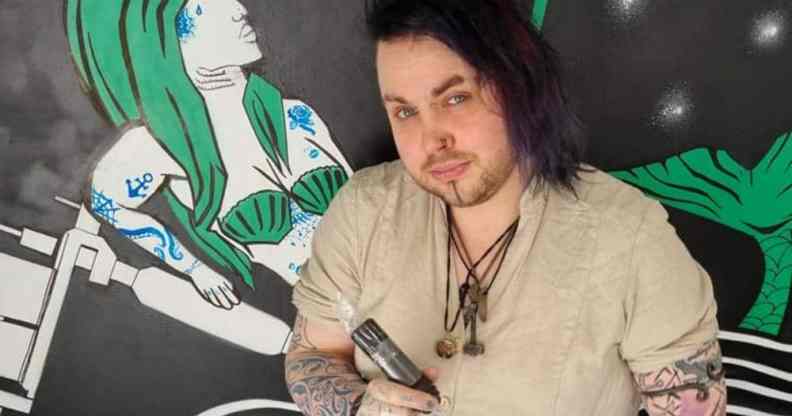Trans-owned tattoo studio takes gender dysphoria battle into its own hands: ‘The UK has no help’

Alden Tank, a tattoo artist at Siren’s Call Tattooing, believes their “niche” charity could help many LGBT+ people in need. (Provided)
Alden Tank, a tattoo artist at Siren's Call Tattooing, believes their "niche" charity could help many LGBT+ people in need. (Provided)
A trans-owned tattoo studio is raising funds to provide free laser hair removal to LGBT+ people with gender dysphoria around body hair.
Siren’s Call Tattooing – a trans and neurodivergent owned business in Salford, Manchester – has created a GoFundMe page to raise the £15,000 needed to start a charity to help LGBT+ people in need of gender-affirming hair removal treatments in the UK.
The funding would go directly towards the studio being able to register as a charity, purchasing a laser hair removal machine and covering the training costs for staff to be able to offer free treatments to trans and non-binary people struggling with body and gender dysphoria.
Alden Tank, a tattoo artist and creator of the campaign, told PinkNews that the idea for the campaign was born out of their own struggles trying to find hair removal services as they transitioned.
“I realised that basically this country has absolutely no help – it’s so underfunded, waitlists are between four to eight years just to get seen on the NHS,” Tank said.
They continued: “The government’s been in power for 10 years, and they’ve not done anything to alleviate that, which means they have no intention of ever really helping our community.”
Tank added that they are a “big fan” of communities helping themselves, especially as the LGBT+ community has given them “a lot of my time”. As such, they wanted to give something back to the people that helped them so much by doing something that it “within my reach” – laser hair removal.
Tank explained that the license to do laser hair removal is “basically the same” as their tattoo license. They already have an inclusive studio, but they need the funds to purchase a machine and register as a charity so they can offer free treatments to the community.
View this post on Instagram
They added that just removing the smallest bits of body hair can not only greatly improve a person’s wellbeing, it can also potentially save trans and non-binary people from being attacked in public.
“Facial hair is probably the biggest giveaway that stops a lot of trans women from passing,” Tank said. “Passing is important psychologically, but it’s also important in order to avoid hate crimes and just being assaulted or insulted in public.”
They continued: “A five o’clock shadow is a dead giveaway of a trans woman, and that can really bring dangerous and unwanted attention.”
Tank told PinkNews that removal of body hair can help with body and gender dysphoria, which they said can be “one of the biggest causes of suicide in trans and non-binary people”. So they believed that laser hair removal services could be a “massive safety feature” for the community.
The website for the Gender Identity Clinic, run by the Tavistock and Portman NHS Foundation Trust, does say that individuals can inquire about facial hair removal services at appointments.
But these appointments come with a lengthy wait time. The clinic currently is receiving an “average of 350 referrals per month”, and there are currently more than 10,600 people on the waiting list for appointments.
The long waits exacerbate poor mental health among trans people and mean many individuals crowdfund to pay for private treatments or even travel abroad for gender-affirming care.
Tank told PinkNews that hair removal services through the NHS can only target one area and may not consider the removal of body hair from other areas like the chest, legs or back.
They explained that hair removal can really help an individual’s dysphoria and give them the boost of confidence to be able to wear a nice summer top or even show some “cleavage”.
Tank added that the cost of the machine was roughly equivalent to the cost of five trans people’s treatments. If they were able to also become a registered charity, the studio could offer treatment to “anybody who can get to us”.
Tank told PinkNews that they hoped the LGBT+ community would be able to help the studio with its goal as “history has proven” that queer people are stronger when “we fight for” each other.
“History has proven that the LGBTQ+ people will only move forward and be able to have a better life if we fight for it and take it ourselves,” Tank said. “Coming together as a whole community is how we’ve gotten this far.”
They continued: “This might be a small and maybe a little niche charity on the whole, but it’s still an important one.
“It can offer so much to many trans and non-binary people in need.”
Suicide is preventable. Readers who are affected by the issues raised in this story are encouraged to contact Samaritans on 116 123 (www.samaritans.org), or Mind on 0300 123 3393 (www.mind.org.uk). Readers in the US are encouraged to contact the National Suicide Prevention Line on 1-800-273-8255.

